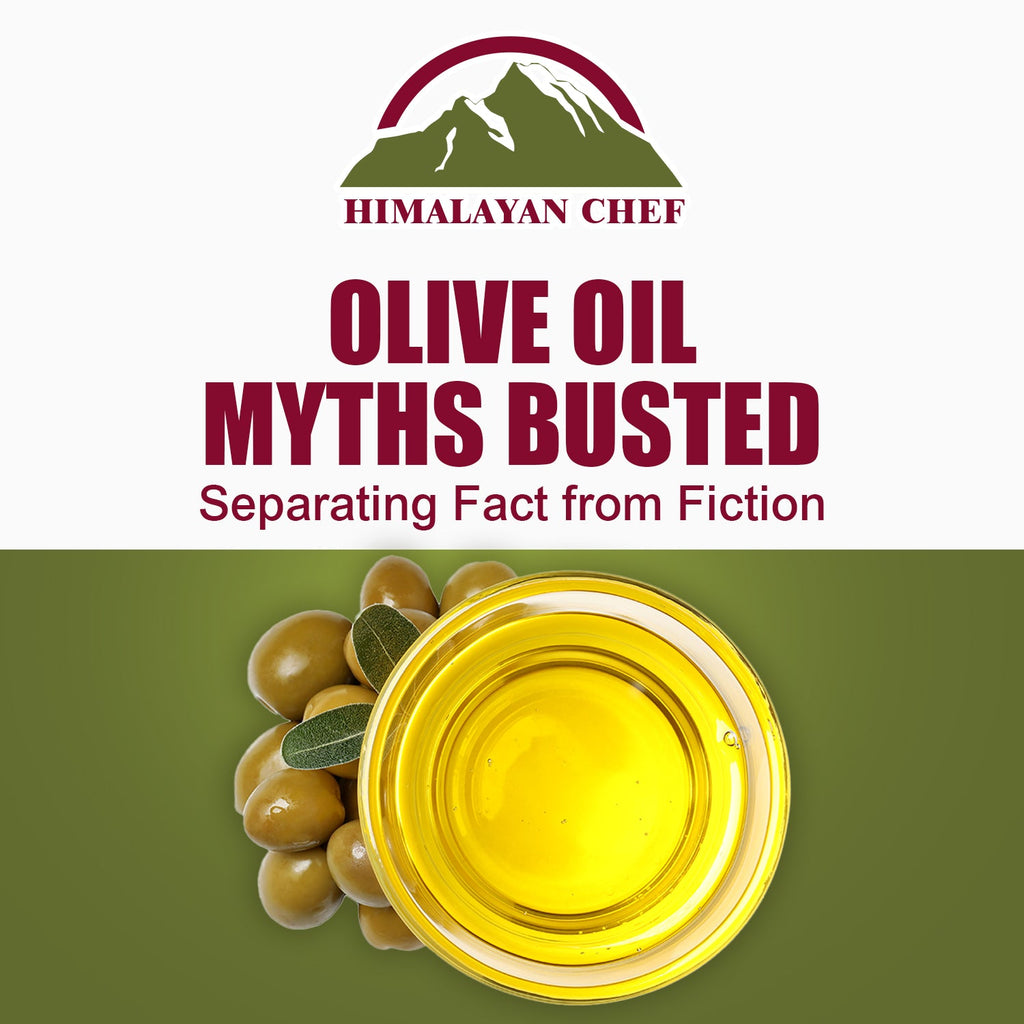Busting the Myths of Frying with Olive Oil in Pakistan
Posted by HIMALAYAN CHEF

In recent years, health-conscious Pakistanis have started switching from traditional cooking oils to olive oil—particularly extra virgin olive oil (EVOO)—for daily meals. But despite its growing popularity, several myths about frying with olive oil continue to circulate across Social Media groups, YouTube channels, and even health blogs in Pakistan.
Is frying in olive oil harmful? Will it ruin the flavor of desi dishes? Is it too expensive for everyday cooking? Let’s bust these myths and explore the real truth behind using olive oil in Pakistani kitchens.
Myth 1: Olive Oil has a Low Smoke Point – Not Suitable for Frying
One of the most repeated misconceptions is that olive oil has a low smoke point and is therefore unsafe for frying. Fact: High-quality extra virgin olive oil actually has a smoke point between 190°C and 210°C, which is more than adequate for most types of frying done in Pakistani homes.
Typical frying methods for dishes like pakoras, samosas, or chicken roast rarely exceed 180°C. In fact, due to its natural antioxidants, EVOO is more stable than most refined seed oils when heated.
Myth 2: Olive Oil Becomes Toxic When Heated
There’s a widespread belief in Pakistan that heating olive oil creates harmful toxins. This myth likely stems from confusion with refined vegetable oils, which are often stripped of nutrients and prone to oxidation.
Fact: Extra virgin olive oil is packed with natural antioxidants such as polyphenols and vitamin E, which help it resist breakdown. Studies show that even when heated, EVOO produces fewer harmful compounds compared to many other oils like canola or sunflower oil.
Myth 3: Foods Soak Up More Oil When Fried in Olive Oil
Fact: Many people think that frying in olive oil results in oily, heavy food. This isn’t true if proper frying techniques are followed.
Oil absorption depends more on frying temperature than the oil type. If the oil is hot enough when food is added, it forms a crust that prevents excessive oil from seeping in. So whether you're frying fish, fritters, or parathas, olive oil won’t make your food any greasier than other oils—if used correctly.
Myth 4: Olive Oil Loses Its Nutrients When Heated
High heat affects the nutritional value of any oil. However, olive oil is more heat-stable than most oils due to its natural structure. It retains a significant amount of its healthy monounsaturated fats and antioxidants even after frying.
Fact: Some research shows that vegetables sautéed in olive oil retain more nutrients than those boiled. So, using EVOO in cooking still delivers health benefits—especially for people managing blood pressure, cholesterol, or diabetes.
Myth 5: Olive Oil Tastes Strange in Desi Foods
Another common concern is that olive oil’s flavor doesn’t suit traditional Pakistani dishes. While some olive oils have a slightly peppery or fruity taste, it doesn’t overpower spices or flavors when cooked.
Fact: Mild or medium-intensity EVOO can beautifully complement chicken karahi, aloo ki bhujia, anda bhurji, and even lentil tarka. It's just about choosing the right variety for your recipe.
Myth 6: Olive Oil Is Too Expensive for Daily Use in Pakistan
Fact: It’s true that extra virgin olive oil is priced higher than banaspati ghee or vegetable oils, but it’s a cost-effective health investment in the long run. Olive oil is more flavorful and concentrated—you usually need less quantity for cooking.
Moreover, the long-term savings on medical costs from using a heart-friendly oil far outweigh the price difference. Many local brands now offer affordable olive oil options for middle-class Pakistani households.
The Reality: Olive Oil Is Perfectly Suitable for Pakistani Cooking
Whether you’re shallow frying kebabs, sautéing vegetables, or giving tarka to daal, olive oil holds up well in every cooking style common in Pakistan.
Here’s why olive oil fits perfectly into our desi diet:
- Excellent heat stability
- Rich in monounsaturated fats (good for the heart)
- Contains anti-inflammatory compounds
- Pairs well with spices and herbs
- Reduces risk of heart disease, stroke, and obesity
It’s time we stop treating olive oil as something exotic and start seeing it as a smart and healthy choice for everyday meals.
Best Practices for Frying with Olive Oil
To get the most out of your olive oil in desi cooking:
- Use extra virgin olive oil for maximum nutrients and stability
- Maintain frying temperature around 160–180°C
- Avoid reusing olive oil more than 2–3 times
- Store oil in a cool, dark place
- Use stainless steel or non-stick cookware for better control

Buy Best Price Unrefined Olive Oil for Frying and Cooking
Ready to make a healthy change in your kitchen? Start with a brand you can trust.
Himalayan Chef Extra Virgin Olive Oil is 100% cold-pressed, ensuring maximum freshness and nutritional value. It’s sourced from high-quality olives and processed to retain its natural flavor, aroma, and health benefits.
Why Choose Himalayan Chef Olive Oil?
- 100% Cold-Pressed Extra Virgin
- Heart-Healthy and Cholesterol-Free
- Perfect for frying, sautéing, and everyday cooking
Enjoy the best prices, exclusive deals, and exciting offers by ordering online with Himalayan Chef. Our delivery service covers Lahore, Islamabad, Rawalpindi, and Faisalabad, ensuring you receive top-quality groceries at unbeatable rates.
From tarkas to karahis, Himalayan Chef Olive Oil gives you a safe and flavorful frying experience—without compromising on health.
TAGS:
SHARE:


